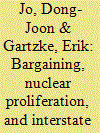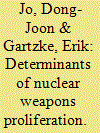| Srl | Item |
| 1 |
ID:
087446


|
|
|
|
|
| Publication |
2009.
|
| Summary/Abstract |
Contrasting claims about the consequences of nuclear weapons rely on different interpretations about how leaders respond to risk, uncertainty, and the balance of power. Nuclear optimists use deterrence theory to argue that proliferation can promote stability and inhibit the use of force. Pessimists argue that proliferation precipitates nuclear hubris, accident, or anger that heightens the risk of war. It is also possible that nuclear weapons have no net effect on dispute propensity. Since states fashion their own bargains, nuclear status is bound to influence the distribution of influence. Proliferation also reflects existing tensions, biasing upward the apparent impact of nuclear weapons on conventional conflict. Instrumenting for the decision to proliferate, the authors find that nuclear weapons increase diplomatic status without much affecting whether states fight.
|
|
|
|
|
|
|
|
|
|
|
|
|
|
|
|
| 2 |
ID:
077072


|
|
|
|
|
| Publication |
2007.
|
| Summary/Abstract |
Nuclear weapons proliferation is a topic of intense interest and concern among both academics and policy makers. Diverse opinions exist about the determinants of proliferation and the policy options to alter proliferation incentives. We evaluate a variety of explanations in two stages of nuclear proliferation, the presence of nuclear weapons production programs and the actual possession of nuclear weapons. We examine proliferation quantitatively, using data collected by the authors on national latent nuclear weapons production capability and several other variables, while controlling for the conditionality of nuclear weapons possession based on the presence of a nuclear weapons program. We find that security concerns and technological capabilities are important determinants of whether states form nuclear weapons programs, while security concerns, economic capabilities, and domestic politics help to explain the possession of nuclear weapons. Signatories to the Treaty on the Non-Proliferation of Nuclear Weapons (NPT) are less likely to initiate nuclear weapons programs, but the NPT has not deterred proliferation at the system level.
|
|
|
|
|
|
|
|
|
|
|
|
|
|
|
|